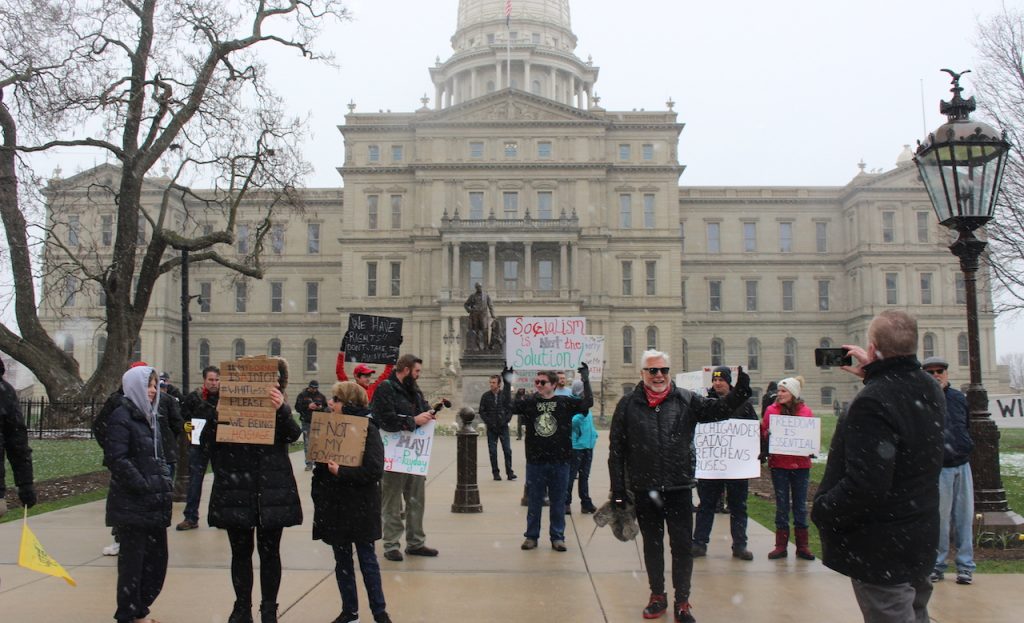Former U.S. Attorney: Republican-led Legislature’s Lawsuit Against Whitmer Not Likely to Prevail
Michigan law professor Barbara McQuade says the Republican-led suit against Gov. Gretchen Whitmer’s executive actions is “weak” and likely to fail.

Photo credit: Abigail Censky / WKAR
Gov. Whitmer has extended the “Stay, Home, Stay Safe,” executive order until May 28th, in line with the emergency declaration, but leaders of Michigan’s Republican-led legislature are suing claiming both are invalid.
“The Emergency Powers of Governor Act gives the governor during times of public crisis the ability to promulgate reasonable orders that he or she considers necessary to protect life, property. And I think most would agree that COVID-19 fits that definition.” — Barbara McQuade, University of Michigan
On advice from state and federal public health officials, Whitmer has steadily lifted restrictions to let some businesses reopen, but Republicans say the legislature needs to have more input. Whitmer extended the state of emergency after lawmakers voted down an extension during a day of tense protests in Lansing.
University of Michigan Law Professor and a former U.S. Attorney, Barbara McQuade, says that the courts are the right place to litigate the matter. This interview was conducted before the extension of the stay-at-home executive order.
Click on the player above to hear former U.S. Attorney Barbara McQuade speak on the lawsuit, in an interview conducted before the “Stay Home, Stay Safe,” order was extended to May 28th.
“It’s an opportunity for them to have a forum to air their grievances,” McQuade says. “And frankly, I think that’s the right place to air grievances, in courts, rather than on the streets or with armed protesters on our capitol.”
But McQuade doesn’t believe the suit will prevail, calling the argument “weak.”
“I think a court could decide it fairly quickly, but they can’t decide it instantly.”
“They allege that Governor Whitmer has violated a statute called the Emergency Powers of Governor Act, which gives the governor during times of public crisis or public emergency, the ability to promulgate reasonable orders, rules and regulations that he or she considers necessary to protect life, property, and to bring the emergency situation under control. And I think most would agree that COVID-19 fits that definition.”
The plaintiffs have asked for immediate relief, but if that’s not granted by the court then there’s a tight timeline to adjudicate before the order and declaration expire on May 28th — if Whitmer doesn’t extend them.
“There’s really no factual findings that are necessary, these are really purely legal questions,” McQuade says. “So I think a court could decide it fairly quickly, but they can’t decide it instantly.”
But McQuade thinks Whitmer helped herself by splitting the actions in two and basing them on two different laws — the Emergency Powers of Governor Act of 1945 and the Emergency Management Act of 1976 — even despite Whitmer extending the state of emergency after lawmakers voted it down.
“I think it’s gonna stand and I think at the end of the day, these executive orders will remain in place. She was careful to do sort of a belt and suspenders act so that if one of those should fail, she still has the other in place.”
Trusted, accurate, up-to-date
WDET is here to keep you informed on essential information, news and resources related to COVID-19.
This is a stressful, insecure time for many. So it’s more important than ever for you, our listeners and readers, who are able to donate to keep supporting WDET’s mission. Please make a gift today.

